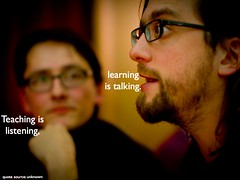 Image by dkuropatwa via FlickrGet inspired by talking to people who are passionate about the same things you are. You've got something you want to improve, people who share your passions probably want to do the same.
Image by dkuropatwa via FlickrGet inspired by talking to people who are passionate about the same things you are. You've got something you want to improve, people who share your passions probably want to do the same.How do you "plan activities to learn from multiple peoples’ perspectives and explore unfamiliar contexts"?
You might "spend more time with a select group of people rather than trying to meet many. It will likely help you learn more." (quote source: see below)
Here's one way to get started:
Step 1: If you don't have one already, get a twitter account.
Step 2: Follow people who teach, or have interests similar to you. Scan through the list of teachers on twitter here or there or in this Google doc. Follow as many as you like. More is good.
Step 3: There are regular "meetings" on twitter of educators (and all sorts of other professionals) discussing how to better do what they do. These meetings are called "twitter chats." You can scan through this fairly comprehensive list of these chats listing the dates and times they "meet" in twitter. Start by lurking. If you really want some inspiration and help getting better at what you do share your opinions and ask questions. (You get 500 points for every opinion you share or question you ask on twitter!) Here are some education related chats to get you started:
| #edchat #EdNewsChat #elemchat #engchat #kidlitart #kidlitchat #kinderchat | #LangChat #libchat #litchat #lrnchat #mathchat #musedchat | #ntchat #schoolgardenchat #schoolschat #scichat #sschat #UKedchat |
By the end of this week, you can consider yourself an advanced player and take an additional 1000 points each time you:
- make a targeted twitter list.
- add an educational blog to read in your reader.
- get suggested articles/books to read by asking on twitter or leaving comments on the blogs posts you've read.
- many bloggers have a "what I'm reading" section in the sidebar of their blogs, look for those and ask for more info about those articles/books on twitter or in the comments of the blogs you're reading.
Please share one or two of the best ideas you learned this week in a tweet, blog, leave a comment here or anywhere and include this tag in it somewhere: #wpedagogy
If you bought or read a book let us know that too! (I'm always looking for good book suggestions. ;-) )
This week we're focused on collecting as many different ideas as we can, we'll dig into this a little more deeply next week and focus our learning a little more; make it more personal and 1 on 1.
(This series of posts inspired by Design Thinking for Educators.)







